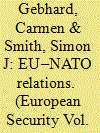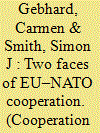| Srl | Item |
| 1 |
ID:
154461


|
|
|
|
|
| Summary/Abstract |
This article provides the framework for the contributions to this special issue. It first puts the theme into context and outlines the main issues that justify further analytical engagement with European Union (EU)–North Atlantic Treaty Organization (NATO) relations to the extent we propose here. We then provide some historical background to frame the discussion, and in doing so also outline the current state of interaction between the EU and NATO. We then briefly contextualise the changing strategic environment shaping the relationship, including recent proposals to implement their declared “strategic partnership”. This introduction then presents an overview of the existing literature to set the stage for a renewed look at the research agenda that has emerged over the last two decades. We close with an outline of the individual contributions to this special issue, which are presented in two sections: one focusing on theoretical and conceptual approaches to the study of EU of EU–NATO relations, and one on the inter-organisational relationship in practice, followed by a concluding synopsis and outlook.
|
|
|
|
|
|
|
|
|
|
|
|
|
|
|
|
| 2 |
ID:
154464


|
|
|
|
|
| Summary/Abstract |
Studies of the relationship between the EU and NATO often focus on the limitations of cooperation, be it at the political or the operational level. However, little is known about the functioning of the political institutional linkages between the EU and NATO. This article therefore studies the main decision-making bodies of the two organisations at the political, ambassadorial level, namely the Political and Security Committee (PSC) of the EU and the North Atlantic Council (NAC) in NATO, as well as their joint meetings. The article employs an inductive Grounded Theory approach, drawing on open-ended interviews with PSC and NAC ambassadors, which reveal direct insights from the objects of analysis. The findings emphasise the impact of both structural and more agency-related categories on decision-making in these three fora. The article thus addresses both the paucity of study on these bodies more broadly and the complete lacuna on joint PSC–NAC meetings specifically, warranting the inductive approach this article endorses.
|
|
|
|
|
|
|
|
|
|
|
|
|
|
|
|
| 3 |
ID:
137642


|
|
|
|
|
| Summary/Abstract |
Maritime engagement in the Gulf of Aden is a puzzling case for anyone interested in the political and institutional problems underlying European Union–North Atlantic Treaty Organization (EU– NATO) cooperation. Although the EU’s operation NAVFOR ‘Atalanta’ and NATO’s ‘Ocean Shield’ operate in the same theatre and with similar mandates, there is no formal link between them. No joint planning has been envisaged, and no official task-sharing takes place. As this article aims to show, cooperation and coordination between EU and NATO forces at the operational and tactical levels have nevertheless worked surprisingly well. Two faces of EU–NATO cooperation become apparent: the political level is dominated by a permanent deadlock, while on the ground and at sea staff have developed a modus operandi that allows them to deliver fairly successfully in complementing yet detached operations. Based on 60 interviews with EU and NATO officials (2010–2013), this article illustrates how the operational and tactical levels have developed ways of coordinating efforts informally despite the lack of a formal framework. It aims to show to what extent and how they succeed at bypassing organizational boundaries and at overcoming political limitations. Although these practices are becoming increasingly institutionalized, it remains to be seen whether this will translate into formal changes.
|
|
|
|
|
|
|
|
|
|
|
|
|
|
|
|